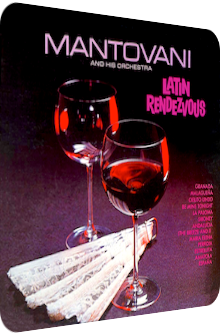
Mantovani
Latin Rendezvous
1963
Latin Rendezvous by Anglo-Italian arranger and conductor Annunzio Paolo Mantovani (1905–1980) is yet another twelve-track album full of symphonic renditions of Latin classics, released on London Records in 1963 and cross-licensed to the well-known Decca label. If one’s interest wanes after this introduction, I cannot blame the bystander, especially not after my stressed emphasis and implied fact that there were way too many Latin albums washed ashore in the 50’s and 60’s, and even now that we have the opportunity to collect and possess them, it is highly unlikely that we will cherish them all, let alone listen to them constantly. This tendency should not degrade Mantovani’s Latin artifact in the slightest, for he does everything he can to channel prestidigitation, surprises and faithfulness into his arrangements.
The orchestra is well-equipped, comprising many mallet instruments, guitars, flutes and accordions next to the mandatory horns and strings. Luckily, Mantovani does another thing perfectly right, and that is the inclusion of bongos and congas. These drums not only link back to their Latin roots, they make it possible to at least think about placing Latin Rendezvous within the boundaries of Exotica. Indeed, Mantovani and Exotica, I have to admit, do seldom appear in the same sentence. But this work justifies their momentary conglomerate, be it via its masses of Space-Age strings, the sun-lit horns… or the sternly dubious and dark sections that grace a few dobs, not duds. Here is a closer look at an LP multiplexing various genres, moods and, again, surprises.
Ruddy shadows, the sanguine flare illumining the night-lit alcove of the adjacent bodega: Ernesto Lecuona’s Malagueña opens side A in that archetypical fashion. It is a wondrous composition, world-famous and beloved both by serious classic listeners and Exotica aficionados alike, even though its shadowy murkiness and utter devotion are more akin to besotted creepiness than paradisiac languor. Mantovani presents a rendition that runs for approximately four minutes, and despite its comparably magnanimous length, the Anglo-American conductor does not waste any time and immediately hits with the lamenting-pompous synergy of the melody. The piano is in the limelight, strings swirl by, but the signature element is the Flamenco – or desperado? – guitar in the middle whose solo twangs emanate a sulfurous afterglow before the castanet-interspersed orchestra prepares for the majestic finale and its eight-note fanfares. A skilled craftsmanship of Lecuona’s eminently dusky and most eldritch work.
Osvaldo Farrés’ Quizas, Quizas, Quizas, also known as Perhaps, Perhaps, Perhaps, is the striking counterpart with its fairy tale flutes alloyed in triangle glints, the clave-accompanied bongo undercurrent and Space-Age strings as well as the spiraling accordions, although the song is indeed aptly placed, for it is torn between two moods: gravitas and exhilarance. The latter mood eventually wins when the accordion crashes into the scenery full force. Whereas Be Mine Tonight by María Teresa Lara and Sunny Skylar is a stellar travelog gem supercharged with pointillistic Venice-like lutes, golden accordions and strikingly lush string cavalcades which altogether neglect the Latin spirit, Cielito Lindo by Pablo Santos marries a Vienna Waltz base with this Latin classic of devotion and grafts solo portions, clinging tambourins and aerose horns to the scenery, making this clichéd artifact somewhat less chintzy.
Sebastián de Yradier’s La Paloma then flows like a transfigured mirage, fully focused on its high-rise violins, castanet runlets and polyphonous flute droplets, with sun-soaked guitars to round off the solemnity. Ernesto Lecuona’s Siboney rounds off side A with a real corker, fully succumbing to a Latin fiesta due to its uplifting coppice of bongos, the mellifluous flutes and shadier segues which are only interwoven to let the brass-driven euphony erupt all the clearer.
Side B opens with another Latin corker that resembles the eternal longevity of Malagueña. It is Agustín Lara’s Granada, presented by Mantovani with a prelude of tumbling strings, a chequered shapeshifting physiognomy of quieter string-driven parts and a further mallet instrument-augmented tipsiness. Even though Granada is also known for its sorrowful gradient, this perception is completely annihilated in this flourishing arrangement. The marimbas and glockenspiels do the fanfare good, as they take away the focus from an all too serious reception of this fanfaronade.
Alberto Dominguez’s Perfidia ventures into Bossa Nova lands afterwards, enchanting with triangle-backed vitreous rhythms, a good-natured Space-Age tonality string-wise and a few pizzicato countermovements thrown in. This is probably the mildest, silkiest offer on side B. A symphonic take of an enthralling Exotica classic. The third time, meanwhile, is the charm, and so Ernesto Lecuona’s Andalucía (aka The Breeze And I) appears in 3/4 time, adding another twist to a hymnic piece that has been transformed and altered by thousands of musicians and bands. Mantovani leaves the melodies intact and offers a second addition: after the sun-soaked beginning, Andalucía moves into bejinxed forests and mystic dioramas before returning to the fissured seashore.
Whereas Narciso Serradell’s La Golondrina focuses adamantly on the string-and-accordion side in order to unleash a romantic whirlwind of mauve-tinted Italian (!) overtones, Lorenzo Barcelata’s Maria Elena is willfully emaciated and much more quiescent or placid, as fragile segues full of bass flutes, their alto counterparts and accordion coils become enmeshed in a tenuous piece, with the finale España by Emmanuel Chabrier flooding the listener's ears with the expected staccato anthems of horns, smashed cymbals and an overall insouciance that cannot even be destroyed by the staggering Crime Jazz horns in the latter half.
Mantovani’s Latin Rendezvous is a wonderful album for the Exotica listener who favors a slightly more serious symphonic takes on material that is few and far between the genre alloy, traversing all boundaries and oozing out of the niches amid them. The source material is well-known and made for eternity, and yet are there quite a few welcome surprises, and paradoxically enough, Mantovani’s orchestra is always best when it stays away from the beaten Latin paths in favor of intermixing other themes. La Golondrina and Be Mine Tonight are prime examples that would severely impress Space-Age fans and even followers of the travelog concept thanks to their magenta aurora and completely carefree enchantment; they not only offer a view through rose-tinted glasses, but a whole telescope! The only problem is that the typical devotee of such music is not prepared to encounter it here on this Latin album, and it so happens that there is the possibility of not realizing the opportunity.
But anyway, back to the album’s aesthetic main ingredient: Latin classics. These are altogether flawlessly interpreted, oftentimes even embellished by saltatory mallet instruments and bongos en masse. These drums must not be underestimated, not even in 1963 when Exotica slowly started to become a fad and face its sunset phase of 30+ years, for it is no self-fulfilling prophecy to see these original Afro-Latin instruments in orchestral settings, not even when the topic literally demands them. My favorite example in this regard which I will never get tired of citing: Morton Gould’s Jungle Drums (1957) whose emerald soundscape features anything but the titular drums! Latin Rendezvous does not make this mistake and can thus be recommended to fans of symphonic Exotica. The drums, accordions, solo guitars and mallet instruments make it possible – or at least open to scrutiny – to place Mantovani’s work in the outer rim of the genre. And so it shall be. Available on vinyl and remastered digital-only versions on Amazon MP3, iTunes and streaming services.
Exotica Review 482: Mantovani – Latin Rendezvous (1963). Originally published on Apr. 27, 2017 at AmbientExotica.com.
